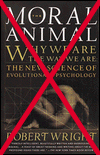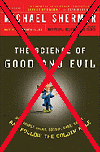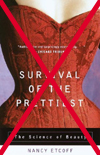 |
The Moral Animal, by Robert Wright.
Robert Wright offers the credentials of a journalist, yet based on the book's claims, one might surmise a rather ambitious one -- eager to find a "natural" justification for competition. Here, human behavior is largely reduced to competition and career moves. There is no sensitivity to social context (as in Boehm's book, say). The overall "message" is not much different than the discredited doctrines of Herbert Spencer, warmed over with modern jargon. |
 |
The Science of Good and Evil, by Michael Shermer
Another person who brings ostensibly good credentials to the task of discussing science and morality is Michael Shermer, editor of Skeptic magazine. Ironically, Shermer does not exhibit much skepticism on this topic, and his overt scientism leads him to an ill-founded belief that scientific facts can ground ethical principles — and can do so objectively and definitively because science ascertains how things "are." Shermer's glib text is perhaps instructive in showing how even well intentioned persons may succumb to numerous fallacies: (1) concluding that a historical (evoloutionary) process justifies the outcome (ontological fallacy); (2) believing that the course of nature is an inherent model, or source of values (naturalistic fallacy); and (3) reasoning that any universal fact is, by virtue of its universalism, thereby inevitable or "right" (universalist fallacy). While the book presents some sound science, it is never differentiated from the speculation and unwarranted extensions, and Shermer seems wholly unaware how he has tried to naturalize a cultural moral perspective — made even worse by the unqualified popularizing tone of "Science Says."
|
 |
Survival of the Prettiest, by Nancy Etcoff
Etcoff's subtitle, 'The Science of Beauty', is both ironic and grossly misleading. This book is a confused melange that tries to portray as instinct: a will to seduction, a desire to be sexy, and universal norms of attractiveness. Add to this a dash of feminism and an implicit stigma for those perceived as ugly, and you have quite a fine example of culturally tainted pseudoscience. Those wishing a primer on sexual or social selection will be better rewarded reading Volume 2 of Darwin's Descent of Man. |

 |
In addition, one may note several anti-evolution books, written by those who are ill informed about evolution and whose political motives in challenging evolution education are relatively easy to spot:
Benjamin Wiker and William Demski's Moral Darwinism: How We Become Hedonists (Intervarsity Press, 2002) and
John West's Darwin Day in America: How Our Politics and Culture Have Been Dehumanized in the Name of Science (Intercollegiate Studies Institute, 2007).
Such books, at best, might serve to motivate teaching the evolution of morality in every introductory biology class, with no excuse for exceptions. |
|